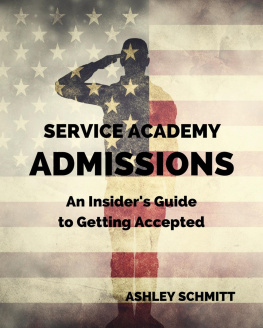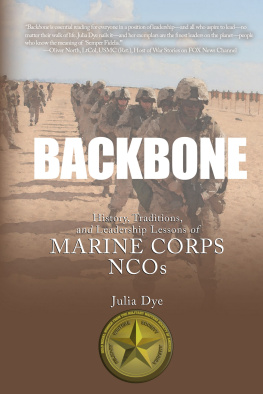T he whole is greater than the sum of its parts. This sentiment is exhibited throughout In the Shadow of Greatness: Voices of Leadership, Sacrifice, and Service from Americas Longest War. Drawing on contributions from more than one hundred authors, advisers, friends, and family members, this book is a team endeavor.
The U.S. Naval Academy alumni and financial donors from the Class of 2002 involved in this project are too numerous to list, so to avoid leaving anyone out, we would simply like to express a collective and heartfelt thank you to all for their generosity and the time they spent on this group effort. We must, however, recognize a small number of folks by name.
Emmy Spencer Probasco, Logan Plaster, Bryce Holt, Barbara Welle, and Chip Crane sacrificed months to mentor untrained writers in the art of nonfiction. Some of our classmates submitted contributions that did not make it into the book. Their efforts are equally praiseworthy and can be found on the books website. Special appreciation goes to T Alford, Caroline Murtagh, Nick Huber, and Julia Floraday Wells, leaders in our class who advocated the project when others were skeptical. Another thank you goes to our dear friend Meg, our most constructive critic and detailed observer and now an honorary member of our class.
Rodney Cocks, Fred Kacher, and Jon Kirby, leaders in military and political affairs, advocated for this book among senior officials in government and business. Without their support, we would have fallen short. Special appreciation goes to a behind-the-scenes group of believers: Maj. Guy Berry, Claude Berube, Chris Brownfield, Capt. James Campbell, Rajiv Chandrasekaran, Angela Mikolajewski, Bill Murphy Jr., Charles Nolan, Gordon Peterson, Cdr. Tom Robertson, and Michael Zuckerman. Each of them provided motivation when the project could have lost steam. We would also like to acknowledge the Center for a New American Security for supporting the book and providing a forum to share our stories with the Washington, D.C., community.
The Naval Institute Press is a publisher that cares about its authors, not just their sales numbers on Amazon.com. Tom Cutler, director of Professional Publishing, fearlessly worked to meet a tight deadline, and his teamwhich included Susan Corrado, managing editor, and freelance copyeditor Robin Surrattmade it happen. We also received support from the institutes talented marketing team. George Keating and Claire Noble provided incredible marketing guidance. Our publicist, Judy Heise, and Brian Walker, special sales manager, were passionate about the books success. Vice Admiral Peter Daly, USN (Ret.) and chief executive officer of the U.S. Naval Institute, supported the book from day one. Special appreciation goes to the U.S. Naval Academy Alumni Association and all our supporters on and off the Yard. Our literary agent, Maryann Karinch, is a true patriot and savvy adviser who made us feel cared for and respected throughout this process.
At the front of the pack, we are honored to have earned a place on this books cover. We are indebted to our parents, friends, and other loved ones. They were patient during countless conference calls, writing road trips, and whiteboard strategy meetings. It was on the second floor of the Nimitz Library, in December 2010, that we decided to make this book a reality. The stories were too good, the passion too rich, and the vision too important. John Enniss creativity, Katherine Kranzs analysis, and Graham Plasters poetic prose all brought the book to life. As for Joshua Welle, he was the navigator in chief, charting the books course from idea to bookstore. We wrote, edited, and labored together, classmates and teammates.
Thank you readers, who by picking up this book have expressed faith in the United States of America. We hope it helps you to better understand its modern military and inspires you to learn more about its veterans. Whether civilian or military, Americans must always stand together in service, promoting freedom and protecting democracy against all enemies, foreign and domestic.
Adm. Mike Mullen, USN (Ret.)
O n a trip to Iraq several years ago, I ran into a young naval officer on an individual augmentee assignment. He was working logistics in Baghdad; he seemed pretty good at it.
He could trace the best routes for ground movement on a map, could tell me how long it would take and how much it would cost to move a tanker of fuel to each forward base, and he could quote Army doctrine for keeping the lines of communication open and where reality conflicted with it. I asked where he came from and heard, to my surprise, that he was a Navy Reserve intelligence officer, with no experience in logistics, let alone logistics on land. He had volunteered to go to war. He did not care in what capacity. He did not care for how long. He did not care where they put him. He cared about contributing.
Sir, he said, Im doing valuable work here, and I'm learning a lot. Ill be a better officer for all of this. I had no doubt that he was becoming a better officer. And I was confident then that he would take the lessons he had learned back to the fleet and to his command, making everyone around him better too.
Tens of thousands of other Navy and Marine officers have likewise deployed to fight in Iraq and Afghanistan these last ten years, including many graduates from the Naval Academy Class of 2002. Many deployed in classic roles: Marine ground combat, naval aviation missions, explosive ordnance disposal, and SEAL operations. Others served in more unconventional roles, like my logistician, or highly technical counter-IED work, economic development, rule of law, and good governance. All of them proved vital to the overall effort. Like that young man, they too had to learn new skills, often at the hands of extraordinary noncommissioned officers, adapt their own preconceived notions of what combat really means, what jointness means, and learn to lead Americas sons and daughters in the chaos and fearand unique challengesof war.
You have heard it firsthand in these pages. You have read their stories, shared in their fears, celebrated their achievements. You have come to know about them what I have long understood: this is a new generation of great leaders, volunteers all, grateful for the chance to serve their country, stretched by the challenges they faced, and tempered by war. I believe they are positioned, because of their diverse experiences, to lead both in and out of uniform in the years to come.
It is through experience that one develops wisdom, and America will need their leadership through the challenges of tomorrow. Many have seen the worst of it, exposing themselves to danger and bringing back home with them memories and burdens they may find difficult to share with anyone. Some gave their limbs. Others gave their lives, leaving families behind to cope and mourn and move on as best they can. America is indebted to Matt Freeman, Rich Andersen, Joe Houston, and the other thousands who made the ultimate sacrifice. All of themat sea and ashoremade an enormous difference.
Iraq is now a democracy, still struggling to come to grips with all that entails, but a democracy nonetheless. The Iraqi people have an opportunity now, one they never enjoyed under Saddam Hussein, to decide for themselves how to govern, how to prosper, how to defend themselves. These men and women helped bring about that opportunity. In Afghanistan, war still rages, but the hard and painstaking experience of counterinsurgency warfare wrought on the streets of Iraq are paying dividends in places like Helmand and Kandahar and Ghazni.
No one is underestimating the scope of the challenges that remain. Endemic and pervasive corruption still robs the Afghan people of their rights. Poor governance still denies them the rule of law. Safe havens in Pakistan still offer the enemy aid and comfort. All of this makes the task more difficult and dangerous, but no one can deny thatonce againthis new generation of leaders has stepped up to provide a foreign government, this one in Kabul, the opportunity to be more responsive to its people.




